Tributes paid to Kettering's Second World War hero Reg Payne
and live on Freeview channel 276
Tributes have been paid to Kettering-born Second World War veteran Reg Payne, who has died aged 98.
Reg, who flew 30 missions on Lancaster bombers as a wireless operator, was a well-known face at Remembrance events and, as well as being a prolific amateur painter, he worked at Kettering Technical College.
Advertisement
Hide AdAdvertisement
Hide AdHis war service saw him take part in Bomber Command's raids on targets over occupied Europe, including ten over Berlin when the survival rate for crews was just one in four.
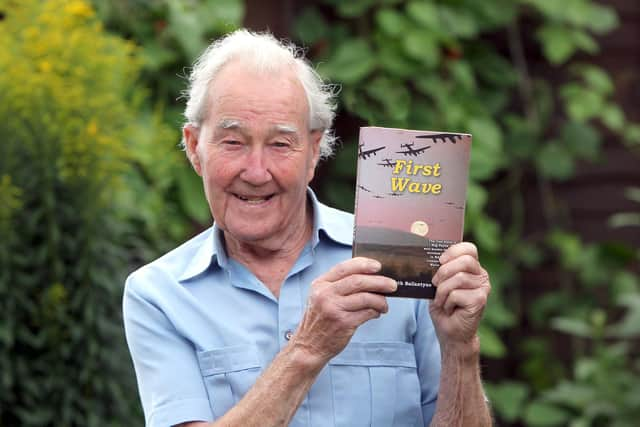

Hand-picked for his crew by pilot Michael Beetham - who was later knighted and appointed Marshal Of The Royal Air Force - Mr Payne escaped death many times, even baling out of a burning aircraft.
Paying tribute to his dad, Reg's son David Payne said: "I was so proud of my dad and what he achieved in his life. He was a fun man and he made a lot of people laugh. He always had a smile on his face.
"I never heard anyone say anything bad about him. I don't know how he found the time for all the painting."
Advertisement
Hide AdAdvertisement
Hide AdReg was born in Washington Square in 1923, in a home 'fit for heroes' that his dad William, a First World War veteran, had been allocated.
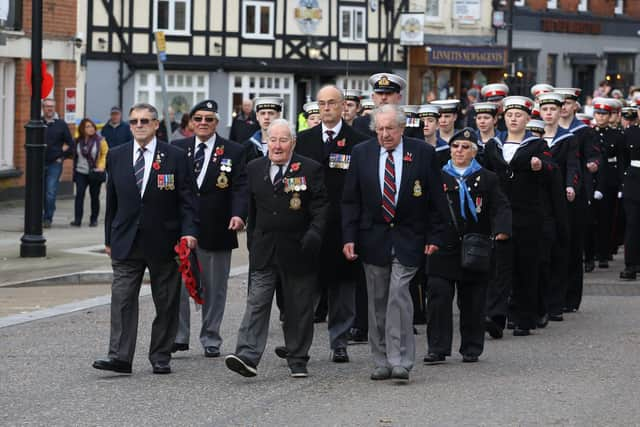

After attending St Mary's Primary School he moved to the Parish School in Horse Market, walking the length of Mill Road to get to and from school and for choir practice. At the age of 14 he left full-time education and found work at the British Legion offices that had recently relocated to Rockingham Road in Kettering. Two years later, war was declared.
Wanting to follow elder brother Arthur into the RAF, Reg had to be content with joining the Local Defence Volunteer Force - later the Home Guard.
David said: "My dad always said that his father had told him he wouldn't stand a chance against a German paratrooper.
Advertisement
Hide AdAdvertisement
Hide Ad"One night he was on duty guarding the railway bridge in Pytchley Road with another man. They stopped a van and asked to see their papers. The driver said to the corporal in charge 'I don't mind being stopped, but can you tell that young lad - my dad - to stop pointing his rifle at me'. The corporal had said 'don't worry mate I've got the bullets in my pocket'. "
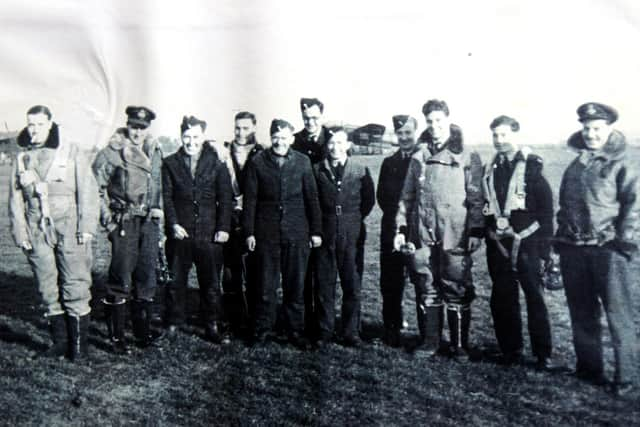

As soon as he could, at the age of seventeen-and-a-half, Reg volunteered for the RAF and, to allow him to pass the entry tests, volunteered with the Air Training Corps to enable him to train as a wireless operator and air gunner like his big brother.
Over the course of a year he learned the skills to be a wireless operator including Morse code and how to fire guns. At the end of the training at a selection process, he was chosen to be part of the crew led by pilot Michael Beetham, joining eight others.
Stationed at RAF Skellingthorpe near Lincoln, the crew would use the lights on the cathedral towers to navigate back to their base.
Advertisement
Hide AdAdvertisement
Hide AdDavid said: "Dad sat in the warmest part of the aircraft and he could look out over the wings, and that's how one day when they were on a training mission he saw that an engine was on fire.
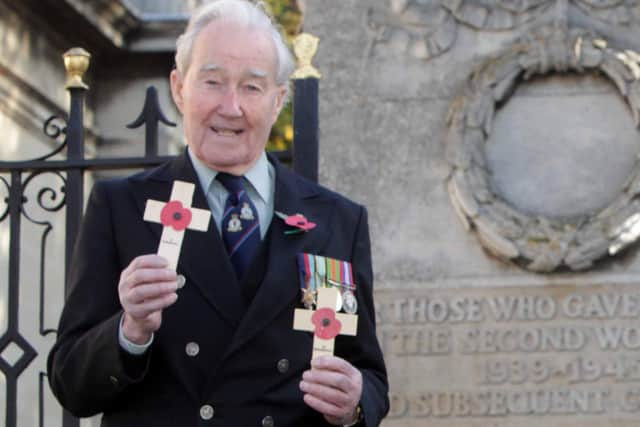

"Dad shouted 'port outer on fire' to let the pilot know. The coolant for the engine had broken when they had been practising with a Spitfire. The engine caught fire.
"That's when dad joined the 'Caterpillar Club' - people who had used their parachutes."
Reg hadn't fully fastened his parachute on the training run. His friend Don Moore hadn't worn his at all.
Advertisement
Hide AdAdvertisement
Hide AdDavid said: "Dad looked into Don's eyes before he left. He couldn't have taken him - the chute wouldn't take two."
When the order was given for Reg to bale out he dropped sideways out of the door but the slip stream threw him back again inside the fuselage. A crew mate gave him a good push and he dropped away.
Hurtling out of the plane he grabbed for the ripcord.
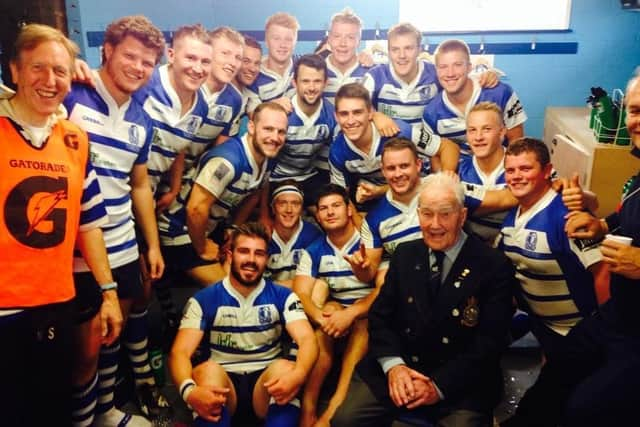

David said: "The parachute wouldn't open. As he was tumbling down he was pulling at the belt. Finally he pulled the D ring and the chute opened. Luckily it stayed on. He was the only one who saw the plane crash because he was much lower than the others."
Years later Reg visited the crash site, close to RAF East Kirkby airfield, where he found parts of the plane that he recovered and made into a model.
Advertisement
Hide AdAdvertisement
Hide AdIt was while in Lincoln on a night out he bumped into his wife-to-be Ena. She refused to get married until the war had finished.
In October 1945 they were married at the United Reformed Church in London Road, Kettering. Reg was then posted to a Forward Repair Unit in Burma.
David said: "Dad put that he wanted to be posted to Desborough, but they sent him to Burma.
"He would always speak about his experience and he wasn't traumatised by it, but at night he would have bad dreams. I think he was re-living it."
Advertisement
Hide AdAdvertisement
Hide AdAfter being demobbed, Reg and Ena settled down to married life with son David born in 1947.
Reg found a job as an engineer at Whitfield, Hodgson and Brough in Lawson Street. In 1965 he was head-hunted to maintain the machinery in the workshop at Kettering Technical College.
It was when he had a health scare at the age of 35 that his family doctor suggested he take up painting for relaxation - a hobby that lasted a lifetime.
Concentrating on a subject close to his heart, Reg painted scenes of aircraft and landscapers and he produced more than 400 paintings.
Advertisement
Hide AdAdvertisement
Hide AdA member of the Kettering and District Art Society, he preferred to give his paintings away than to sell them.
Keith Hill, a professional artist and friend of Reg, said: "He was a very accomplished artist and he helped me on my painting 'Safely Home' - that was inspired by him.
"He could tell a tale. He did a lot during the war and he would tell you about it but it wasn't boasting.
"It was a privilege to take him to RAF Alconbury, with my dad, where he spoke to the American commander about their experiences.
Advertisement
Hide AdAdvertisement
Hide Ad"They say that a hero is an ordinary person who does extraordinary things. He'll be greatly missed."
After his first wife Ena died in 1988, Reg joined a walking group where he met second wife Freda. They married in 1990 and moved to Rothwell. After her death in 2012, Reg collaborated on his wartime memoirs with Kenneth Ballantyne in the book 'First Wave' published in 2013. He sold all 4,000 copies.
Dave added: "He wasn't a cuddly dad but I knew that he loved me."
Reg died on Saturday, January 8. He leaves his brother Brian, son David, grandchildren Joanne, Kerry and David and seven great-grandchildren.